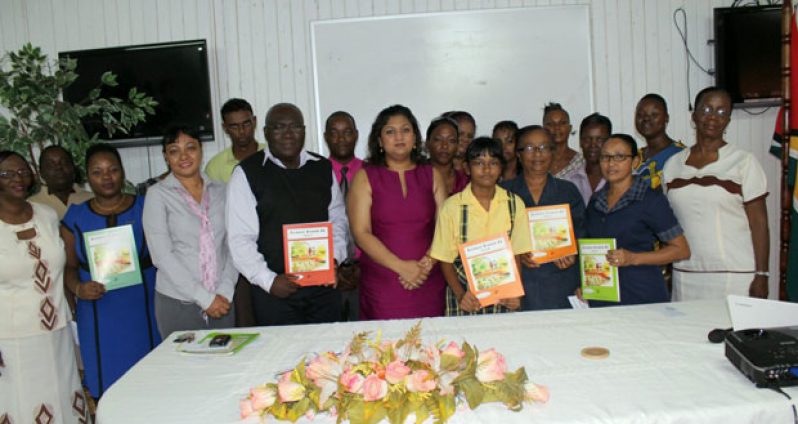THE National Centre for Educational Resource Development (NCERD), in collaboration with the Ministry of Education, successfully launched the revised Easy Path “Science Around Us” textbooks for students in grades one to six at the primary level.Birthed at a meeting with Education Minister Priya Manickchand, the initiative came through an idea to have the science textbooks revised so as to align them with the curriculum.
The team of writers, which included Science teachers from various levels of the primary school system, conducted a Gap Analysis which compared the Science books with the corresponding curriculum, and came to the conclusion that some science-related issues, such as Global Warming, were not being addressed in those books. The group consequently embarked on a mission to revise the Science books.
The team which worked together in compiling the books included Ms. Corrinne Osbourne, Ms. Petal Jettoo and Ms. Eglice, who developed the grade one science book; Mr. Avinaash Persaud and Ms. Amina August, who worked on the grade two book; Ms. Wendel Roberts, Ms. Sonia Motilall, Ms. Timeka Lewis, Ms. Gladys Dickson-Damon and Ms. Martina Archer-Semple, who worked on the grade three book; Ms. Karen Collins and Ms. Trudy Moore, who worked on the grade four book; Ms. Kathryn Persico-Newton, Ms. Tessa Abiola Wilson and Mr. Andre Johnson, who worked on the grade five book; and Ms. Donna Johnson and Ms. Holly Perreira, who completed the grade 6 book.
Mr. Raymond Hutson, Assistant Chief Education Officer, in his brief remarks, reiterated the idea which surfaced to align the books with the curriculum. He emphasised that primary education stimulates critical thinking and encourage creative ideas, and as such the books’ aim is to promote an environment wherein there is appreciation for Science.
He added that the books are designed to better equip pupils for their journey to the secondary school level.
Education Minister Priya Manickchand, in her address at the launching, acknowledged the writers for their dedication, and highlighted the continuous work ongoing at NCERD to foster development of a better educational system.
The minister noted that the revision process is one which will become routine as society develops and changes occur. She added that monies fuelled into the education system are the largest of any sector, and as such it needs to be utilised in a manner that will help to benefit every child in the public school system.
Making reference to the continuous economic growth Guyana has seen over the last eight years, Minister Manickchand praised the country’s macroeconomic environment, and said that “because of national stability, the Government has been able to invest in education”. She added that the initiative came against a backdrop of exploitation from importing books which could not adequately facilitate each child at the primary level.
Discolouration of black and white copies of textbooks was also posing problems, and, as such, this implementation sought to combat those issues that were being faced in the primary schools.
The next initiative currently in progress is that of having Readers (type of book) in the schools. The ‘Atlantic Readers’, currently in process of being written, is expected to be introduced by September of this year.
The Science books will be available to every child in the primary school along with Mathematics, Social Studies and English textbooks. They will also be made available online for free through the ministry’s efforts in making them easily accessible nationally.
Some 85,000 students will benefit from the implementation, which seeks to provide every child with equal access to educational resources. “The Science textbooks reflect the realities of 2014 Guyana”, Minister Manickchand concluded.
The launching was attended by teachers and students from the private and public school systems, who entertained the gathering. Pupils of St. Angela’s Primary Choir lustily sang a folksong after A St. Margaret’s Primary pupil would have set the tone with the poem “The Little plant”.
Only recently, Finance Minister Dr Ashni Singh estimated the budget for the Education sector at $32.3B, the largest amount fuelled into any one sector.
By Ravin Singh



.jpg)








